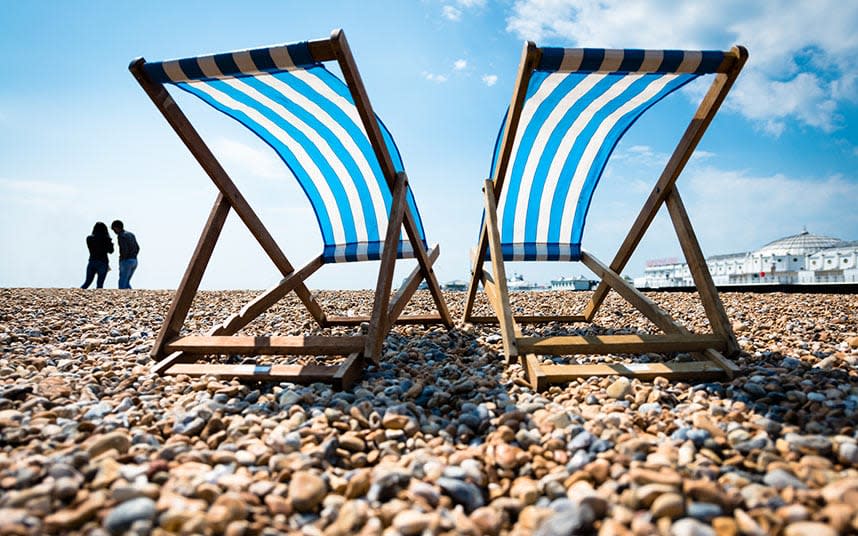Holidays after Brexit – should I book now or wait for a deal?

The Government has been forced to deny it is preparing to warn families against booking holidays for travel after March as the prospect of a no-deal Brexit looms ever closer.
Despite assurances from Downing Street, there is no doubt that a lack of clarity remains over exactly how leaving the EU will affect travel plans next summer.
So how exactly should you approach booking holidays for next year and what are the key issues at stake? Below, we run through what the likeliest Brexit scenarios mean for trips to and from Europe after March 29.
What was the Government said to be warning of?
According to the Sunday Times, the Government was preparing to advise families not to book holidays after the end of March, amid fears that a no-deal Brexit could lead to the failure of specific tour operators, leaving holidaymakers stranded or out of pocket.
A spokesperson for Number 10 rejected the claim as “categorically untrue”, but warnings over travel next year are not new.
Is it safe to book holidays for next year?
“We have already cautioned against travelling for a couple of weeks after March 29 in case of short-term disruption,” says our chief consumer editor, Nick Trend. “It seems extremely unlikely that any such disruption will continue beyond the spring.
“If you are nervous about potential problems, the closer we get to March 29 without a Brexit deal, the more reason there is to consider postponing booking until the situation becomes clear.”
Abta, which represents British tour operators, issued a statement suggesting it was in agreement with Number 10, that there is no reason why holidays next year should be impacted by a no-deal Brexit. However, it has also published advice for travellers.
“There is nothing to suggest that you will not be able to continue with your holiday plans after March 29,” Abta said. “Even in a no-deal scenario, the European Commission has said flights to and from the UK will still be able to operate.”
Abta said that travellers booking a package holiday with a UK travel company “enjoy the most comprehensive protection”, meaning they have the right to a full refund should it not be possible for their holiday to be provided.
Will flights be disrupted?
Over the last 12 months there have been repeated warnings that flights could be grounded at the end of March should the Government fail to secure aviation agreements with EU countries and beyond.
However, the Government, the European Commission and Airlines UK, which represents 13 British carriers including British Airways and Easyjet, have all said there will not be disruption to flights after March.

Abta says: “UK citizens can be reassured that regardless of the Brexit outcome planes will still fly between the UK and the EU: if a deal is agreed then we will be in a transition period, meaning everything will stay the same until the end of December 2020 and flights will continue as normal.
“Even if we are in a no-deal scenario, the European Commission has said that UK airlines will still be able to operate flights between the UK and the EU. The UK government has offered similar assurances for EU airlines.”
That said, Nick Trend says it is hard to imagine a perfectly smooth transition: “Until something is officially sorted, I personally would avoid booking any travel which involves departing during the couple of weeks or so after March 29 because of the general risk of delays and disruption, both in the air and at borders.”
As with holidays, airlines are continuing to sell flights beyond the end of March. However, travellers booking flight and accommodation separately are not afforded the same protection as they would by an Atol-bonded package holiday. Anyone booking flights independently should do so by credit card where possible, so there is an opportunity to claim a refund should anything happen, under Section 75 of the Consumer Credit Act.

Will I need a visa to visit Europe next year?
No. However, last week the European Commission announced that from 2021 British citizens will need to pay a fee - expected to be €7 (£6.30) - for visa-exempt travel. It will probably be valid for several years in the same way that a US ‘Esta’ permits travel to America.
How do I Brexit-proof my holiday?
One option is to pick a destination that will be unaffected by our leaving the UK.
Nick Trend has some recommendations. “There are, of course, very few options in geographical Europe itself. A glance at the map shows that only Iceland and Norway (which are not at their best in April), Switzerland and a small clutch of countries in the Balkans and the far-eastern side of the continent remain outside the EU.
“But there are some interesting options a little further afield. Here are some suggestions – places that you can reach on a flight of five hours or less. Flights might be relatively expensive, but your pound will go a lot further than in most EU countries.
City breaks
“My number one choice for next Easter is Istanbul. There are very few cities in the world that combine such a deep and complex history, such a fascinating food culture, and a shopping experience to match the Grand Bazaar. Tourist numbers have been well down for the past couple of years and, while Turkey’s political problems are not over, the situation is much more stable now. Alternatively, Marrakech is lovely in the spring sunshine and just over three hours’ flight away. St Petersburg is one of Europe’s great cultural centres, rates highly in our readers’ surveys and is an alluring introduction to Russia. It won’t be warm – expect temperatures peaking at about 46F (8C), but so many treasures are in its palaces and museums that the weather is unlikely to spoil your break.

Beaches
“Options for reliable short-haul sun in April are always limited. Cyprus and the Canaries are the safest choices and I’m sure they will do their best to make life easy for UK tourists after Brexit. But to avoid the EU, I might be tempted by the beaches and Kasbah of Essaouira on the west coast of Morocco. It won’t be scorching, but should top about 68F (20C) most days. For real heat, one of the Egyptian Red Sea resorts would work. Or, if you are happy with a pool, a Nile-side break in Luxor or Aswan is a great option – the climate is wonderfully hot and dry. A more offbeat option is the Israeli Red Sea resort of Eilat; Wizz Air (wizzair.com) started direct flights there from Luton earlier this year.”
What other issues should travellers be concerned about?
Passports
Travellers visiting the EU after March 29 have been advised to have a passport with at least six months of validity left.
Higher airfares
Even though it is unlikely flights will be grounded, the continuing success of the no-frills airlines, reducing fares and opening up new routes between the UK and the EU, is less certain, meaning fares could rise.
A weaker pound
Sterling is weaker and holidays have become more expensive since the Brexit vote. In June 2016, the pound bought about €1.30; now the rate is about €1.10. If a good Brexit deal is signed, it will strengthen, if not, it seems likely to remain depressed.

Delay compensation
The remarkably high levels of compensation under the EU directive on flight delays are now part of UK law. British airlines will likely lobby hard to get the protection watered down after we have left. The Civil Aviation Authority has said the UK will adopt “all current air transport safety regulations into UK law”, maintaining existing levels of consumer proteciton.
Health protection
The European Health Insurance Card (EHIC) gives us free or reduced-cost treatment in other EU countries. The Government has signalled an intention to keep the scheme – or a similar one – going.
Roaming charges
We won’t be entitled to free roaming after Brexit. But Vodafone and Three have agreed to continue it, and the Government now says it may cap data charges at £45 a month for operators that don’t.
Less protection
Financial protection arrangements for package holidays were enshrined in UK law under the EU directive of 1992 and extended again in July. It seems unlikely that the UK Government will want to water them down, although they will, of course, be free to do so.
Working visas
The ability for you, or your children, to work in the EU – perhaps to fund a trip around Europe by taking casual jobs – depends on our membership. Since restrictions on freedom of work and movement seem inevitable, it is almost certain that British citizens will no longer be able to work in EU countries without a visa.
Beach pollution
Over the past 25 years, EU rules have forced Britain to clean up its beaches, though more improvement is still needed. Is that more or less likely to happen now there will no longer be pressure from the EU? We will see.
Duty-free shopping
We lost the right to duty free when travelling between EU countries in 1999. But we gained the right to bring home virtually unlimited amounts of duty paid goods – good news because duty on wine in France is signicantly less compared with the UK. Now that we are leaving, the good news is that, presumably, we will revert to the same arrangements which apply to all other countries. We will have a duty free allowance of 200 cigarettes, 16 litres of beer and four litres of wine, but above that we will have to pay about £2 for each bottle of wine we bring home.
Green cards
Abta says UK citizens driving their vehicle within the EU would be required to obtain and carry a physical Green Card in order for a UK car insurance to be applicable in the EU. These cards would be issued by insurers and you may be charged a small fee to cover administration costs.


